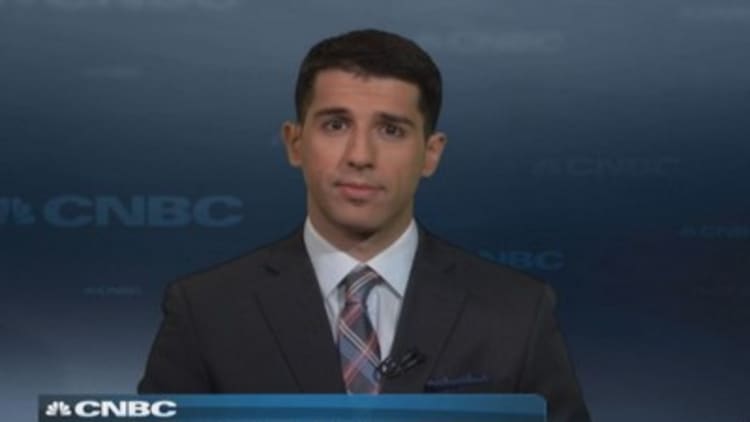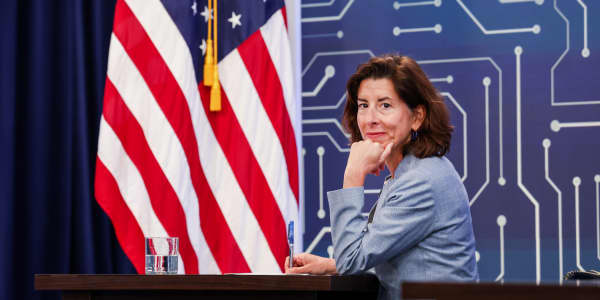
The recent elections underlined a growing tension in political money circles: Business people are increasingly fed up with the activist wing of the Republican Party. It's a trend that will have broad implications for next year's midterm elections and the presidential race in 2016, political experts say.
In Alabama on Nov. 5, Republican Bradley Byrne beat tea party favorite Dean Young for a U.S. House seat in part because the business community rallied around him. In Virginia, Democrat Terry McAuliffe bested tea party-backed Republican Ken Cuccinelli partially because some conservative business donors wouldn't give to the GOP campaign—or even switched sides. And in New Jersey, moderate Republican Chris Christie crushed tea party candidate Seth Grossman in the primary and then Democrat Barbara Buono in the general election because of strong business support.
And there's more to come. Business interests appear to be rallying behind moderate Republicans Brian Ellis, David Trott and Mike Simpson against tea party-approved challengers Justin Amash, Kerry Bentivolio and Bryan Smith for House seats in 2014 (Ellis and Trott are running in Michigan and Simpson is in Idaho).
(Read more: Christie wins big, tea party loses in Va. race)
"We're seeing a fraying of the longtime alliance between the business community and activist, fiscally conservative Republicans," said Christopher C. Hull, an adjunct professor of politics at Georgetown University and head of political advocacy technology firm BlastRoots.
"Both used to be aligned on lower taxes and smaller government. Now the business community isn't so sure anymore. More and more of the business community depends on government contracts, regulations or tax policy to keep them in business," Hull added. They "need allies who win, not ideologically pure candidates who lose."
The Virginia gubernatorial race is a prime example of that battle.
"If the tea party wants to be part of winning in 2016, they're going to need to be inclusive, they're going to need to stop challenging Republican incumbents in primaries," said Bobbie Kilberg, a longtime Republican operative and donor who is also president and chief executive officer of the Northern Virginia Technology Council.
"They can spend all the time they want in making their points based on principle, but if you cannot win an election and you cannot govern, what is the point?"
Kilberg has supported many Republicans in the past but refused to back Cuccinelli, who was outspent $32 million to $19 million by McAluliffe, according to the Virginia Public Access Project. Kilberg said she was turned off by Cuccinelli's focus on social issues like gay marriage and abortion and the tea party-fueled government shutdown (in contrast, the technology group Kilberg leads endorsed Cuccinelli).
(Read more: Shutdown shakes already shaken consumers: Poll)
Dwight Schar, the executive chairman of home-building company NVR and former national finance chair of the Republican National Committee, went so far as to switch sides.
"As a Republican and especially as a Virginia businessman, I am supporting Terry McAuliffe for governor," Schar wrote in an endorsement. "Terry is going to work with both parties to enact mainstream solutions that reduce traffic, improve our schools, and develop our workforce for the global marketplace. Ken Cuccinelli's ideological agenda has divided Virginians and blocked progress on education and transportation for long enough."
Observers noted the Virginia trend.
"Some heavy-hitting past GOP contributors switched to support the Democratic nominee, in part out of concern that a tea party-backed Gov. Cuccinelli would result in boycotts of the state and refusals by certain businesses to locate here," said Mark Rozell, a professor of public policy at George Mason University.
"Additionally, some in the business community believed that he simply was not attentive sufficiently to their issues, but was more driven by the culture wars."
Big business associations are also becoming more involved in primaries in hopes of, in their view, producing more electable general election candidates who are better for business.
"The 16-day-long government shutdown served as a wake-up call for the business community at large, especially in the retail industry, that we all need to be more actively engaged in both the policy and political arenas," said National Retail Federation lobbyist David French.
"We believe that the business community will play a much larger and more visible role in political campaigns moving forward, be it for primary or general elections, and ally with state and local partners and others to assist with candidate identification, member education, grass-roots engagement and get-out-the-vote operations."
NRF wouldn't specifically address the tea party, but has supported more mainstream candidates in recent elections. They include Republican Rep. John Boehner and Democratic Rep. John Conyers, according to public records summarized by the Center for Responsive Politics.
The U.S. Chamber of Commerce wasn't involved in the New Jersey or Virginia gubernatorial races—it customarily stays out of state politics—but did back Byrne in the Alabama House race.
"The U.S. Chamber is proud to have supported Bradley Byrne and congratulate him on his victory. Byrne is clearly the best candidate to help grow our economy, create jobs and put our nation back on a sustainable fiscal path," said the group's national political director, Rob Engstrom.
Byrne also received support from the political action committees of the National Association of Home Builders, the Independent Insurance Agents and Brokers of America, the National Beer Wholesalers Association, BASF and Pfizer, according to the Center for Responsive Politics.
One of Byrne's prominent business supporters said the big money that rallied behind him was more about opposing Young.
"While some have said that the Alabama special election was a debate between the establishment and the tea party, we never believed that," said Brian Baker, president of Ending Spending, a conservative political advocacy group created by TD Ameritrade founder Joe Ricketts.
"The Alabama race was all about the question of who would be the most effective conservative leader in Congress, and the answer to that question was clear: Bradley Byrne. Mr. Byrne has a great record of being a reform-minded fiscal conservative."
Christie's re-election as governor of New Jersey is already being talked about as a national model for Republicans to gain broader support; a common refrain is that he could run for president in 2016.
"He may not be the right wing's favorite purist but he is in a position to shape the way his state is run. He was able to win and pursue policy objectives with bi-partisan support like a balanced budget and smaller government from a position of authority," Fred Malek, a prominent Republican donor and former president of Marriott Hotels and Northwest Airlines, wrote in a recent Daily Caller op-ed.
"Unlike the Ted Cruzes of the world, his GOP ideas won't be shouted from the back bench but from the highest office in his land. That distinction should be a lesson to us all."
(Read more: How NJ Gov. Chris Christie could save the GOP)
Of course, tea party and other dissident Republican politicians continue to receive support from groups with business ties, such as political action committees from Koch Industries and Citizens United.
But the increased support of more mainstream GOP candidates appears likely to continue.
Besides Michigan and Idaho, Republican Sens. Mitch McConnell, Lamar Alexander and Lindsey Graham are all facing tea party 2014 primary challenges in their respective states (Kentucky, Tennessee and South Carolina).
That bothers some moderate GOP donors. "What they're trying to do to McConnell, Alexander and Graham is disgraceful," Kilberg said.
It's likely business groups will jump into those races.
"I fully expect a major funded effort by mainstream conservative groups to try to push the GOP back toward its traditional roots by the time of the 2014 elections," said Rozell of George Mason. "There is a major battle brewing for the heart and soul of the party."
—By CNBC's Lawrence Delevingne. Follow him on Twitter @ldelevingne.






